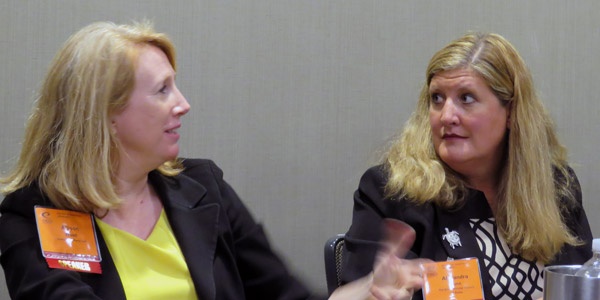WASHINGTON — The Supreme Court’s stay of the Clean Power Plan has largely ended the progress states were making toward creating regional frameworks for compliance, says Alexandra Dapolito Dunn, executive director of The Environmental Council of States (ECOS).
But even the most coal-dependent states are pondering ways to reduce their carbon footprints, she told a panel discussion at the Energy Bar Association’s Mid-Year Energy Forum last week.
“‘Carbon-considered’ is [the term used by] states that might have at one time been questioning whether or not there was climate change,” said Dunn, whose organization represents state environmental officials. “They’ve come around now.
“I think states will be more open to bringing renewables into their [generation] mix than they may have been before,” she explained. “There are companies that are located in very coal-oriented states that are already projecting ahead with their boards of directors and their shareholders to bring in a little bit of renewables, a little wind, a little solar, do some research and development in battery technology. You might not have seen that before.”
Two CPP opponents told the EBA forum that even if the EPA rule withstands legal challenges by states and utilities, its implementation will likely be delayed. The D.C. Circuit Court heard arguments on challenges to the rule on Sept. 27. (See Analysis: No Knock Out Blow for Clean Power Plan Foes in Court Arguments.)
“The likelihood of this rule being implemented the way it was finalized in August of last year is getting lower all the time,” said former EPA General Counsel Roger Martella Jr., of Sidley Austin. If the rule is upheld, he said, its 2030 deadlines could be pushed back to 2032 if the court also “tolls” the deadlines to account for inaction during the stay.
Allison Wood of Hunton & Williams, who argued before the D.C. Circuit on behalf of non-state challengers, agreed. Wood said the postponement of the D.C. Circuit arguments, which had originally been scheduled for June, means no Supreme Court review is likely until its next term, starting October 2017.
Dunn said the stay ended discussions among state officials on the technical issues concerning compliance, such as the development of emission trading programs.
“There were some really fantastic forums … where people were really putting their noses to the grindstone and trying to sort out these technical questions,” she said. “I almost wish we were still putting the same level of intensity into sorting out some of these questions that probably will be part of any future … carbon-managed environment.”
While some states are continuing their work and renewable generation is continuing to benefit from technological innovation, she said, “People are definitely following their own playbook at this point.”
– Rich Heidorn Jr.






